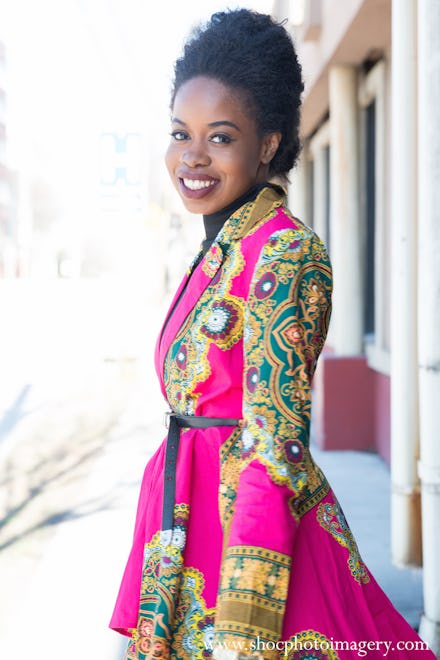This fashion e-commerce site celebrates "the beauty and vibrancy of Africa"

The power of the internet to facilitate global commerce and cultural exchange is well-established. But Zuvaa, an online fashion marketplace founded by 27-year-old Nigerian-American Kelechi Anyadiegwu, is doing both at once.
Zuvaa — a play on the word zuva, which means sunshine in Zimbabwe — is a digital platform created by Anyadiegwu in May 2014. The website goes beyond connecting people to stylish African fashion items; it also provides a space for emerging African designers to share their authentic stories and challenge common misconceptions about African fashion.
"It's about really showcasing the beauty and vibrancy of Africa," Anyadiegwu said in a phone interview. "Zuvaa literally brings together everything that I love in life, from the African continent, to fashion, to technology, to my community."
Ignorance and appropriation. Though she was raised in the U.S., Anyadiegwu's parents made sure to impress upon her the importance of her heritage, from giving her an African name to visiting family back in Nigeria. A self-described "total fashionista" from a young age, Anyadiegwu forged a fashion sense that balanced colorful African prints with staying on top of the latest trends of her peers.
As she got older, Anyadiegwu noticed more people complimenting her and asking about her unique garments and textiles. At the same time, she noticed the fashion industry wrongly labeling and attributing similarly inspired prints as "ethnic" or "tribal."
The fashion industry's recent use of phrases like "wild" and "tribal," along with ads showcasing white models amid bongo drums and Kenyan backdrops has prompted considerable backlash from Anyadiegwu and others, who view such things as cultural appropriation of African cultures and feel they present a troubling ignorance about the history of traditional textiles and native design.
While in graduate school at Carnegie-Mellon University, pursuing a Master of Human-Computer Interaction degree, a lightbulb went off: "It just dawned on me the demand and the want and the need of African textiles from people around the world," Anyadiegwu said. She wanted people to know the prints and textiles by their proper names and origins.
With no prior business experience, Anyadiegwu dropped out of grad school in 2014 and drew on her background in web design, marketing and social media to create Zuvaa's social channels and eventually a visually engaging digital platform.
Building Zuvaa took about six months, during which Anyadiegwu essentially worked as a one-woman operation. "Funny enough, I felt like running my own business has kind of been what I always wanted," she said. "I just knew that working a corporate 9-5 just wasn't for me... [Instead I wanted to] create something that people would find useful, something that would really help people in my community."
In a powerful demonstration of how much the internet has propelled the globalization of business and culture, Anyadiegwu used social media to reach out to designers back in Africa to see if they wanted to contribute to the site. Now, designers are the ones contacting her.
Socially-minded social media. Zuvaa works with more than 100 African brands, and according to Anyadiegwu, has helped designers exponentially grow their income almost tenfold. "It's been really exciting just being able to support merchants and designers and supply them with the tools and resources they need," she said, essentially connecting them to customers they never imagined possible.
Zuvaa's social media is a big part of what distinguishes the site from other online marketplaces selling African designs. The content strives to create "beautiful imagery [and] beautiful stories," which ultimately fosters a community between the customers and the designers.
As the business and the community grow, Anyadiegwu is planning to expand Zuvaa's impact by opening pop-up shops in cities like Oakland and New York. She's also working with the designers on creating private collections and home accent lines.
"We all feel like we are a sisterhood, we are a brotherhood," said Anyadiegwu. "We are just a community of people around the world who are excited about supporting African [people and] giving them an opportunity to strive."